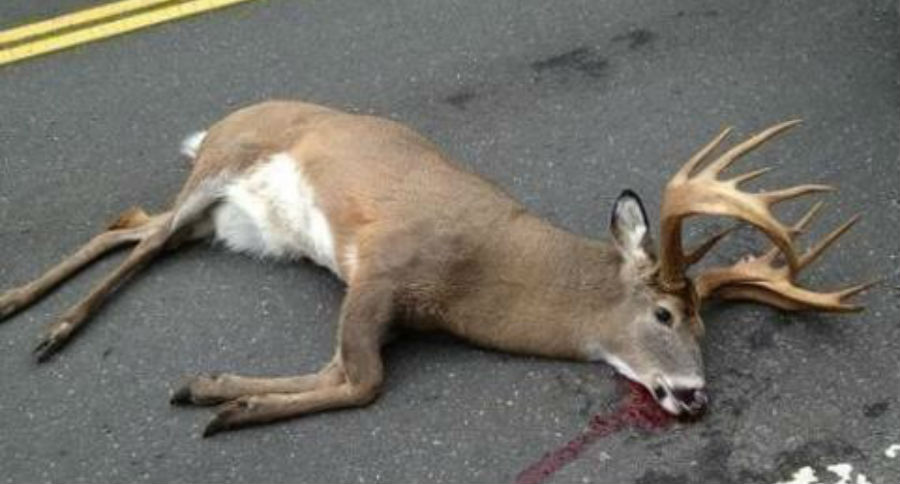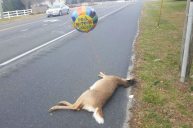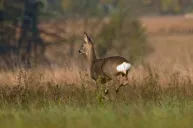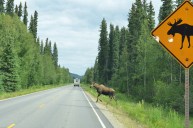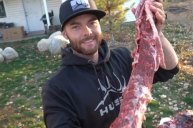A new Oregon law allows motorists who strike deer and elk to claim and consume those road-killed animals.
While it does provide some comedic material—remember Granny from the Beverly Hillbillies happily retrieving road-killed possum or raccoon for the family dinner table—claiming and eating roadkill is now legal in Oregon. Many folks would say it's about time.
The state recently passed a law allowing drivers to claim deer and elk they hit in vehicle collisions. Motorists collide with hundreds of thousands of animals on roads and highways in the United States every year.
Many states allow drivers to claim the critters they hit with their cars, and who would argue with such provisions? That's a lot of fresh meat that would otherwise go to waste.
Even PETA apparently approves of the practice.
A USA Today article indicates that PETA's website declared, "Eating roadkill is healthier for the consumer than meat laden with antibiotics, hormones and growth stimulants, as most meat is today."
The Oregon Department of Fish and Wildlife Commission adopted the new rules last fall. They went into effect on Jan. 1, 2019.
The ODFW website lists several stipulations associated with the new roadkill consumption rules.
If a person intends to salvage road-killed deer or elk, he or she must complete a free online permit within 24 hours of claiming the animal.
"The permit system is intended to track the number of animals being salvaged," said ODFW spokeswoman Michelle Dennehy.
To receive a permit a free online, an application is required. The application must be submitted within 24 hours of salvaging the deer or elk. Do not complete the online permit until you're actually salvaging an animal as specific information about location and time of salvage is required.
Below are the key regulations for salvaging roadkill in Oregon:
- Only deer and elk accidentally struck by a vehicle may be salvaged.
"If this leads to animals that are accidentally stuck not being wasted, that's a good thing and the intent of the law," Dennehy said. "The goal is to put the meat to good use if possible."
Whitetail deer can only be salvaged from Douglas County and east of the crest of the Cascade Mountains because of the protected status for whitetail deer in most of western Oregon. - Roadkill salvage is forbidden from the reservation lands of any sovereign tribe.
- You must remove the entire carcass of the animal, including gut piles, from the road.
- Intentionally hitting a deer or elk in order to salvage it remains unlawful.
- Any person (not just the driver who struck the animal) may salvage a deer or elk killed by a vehicle.
- Only the driver of the vehicle that struck the animal may salvage an animal in cases where a deer or elk is struck, injured and then humanely dispatched to alleviate suffering. Law enforcement must also be immediately notified.
- Antlers and head of all salvaged animals must be surrendered to an ODFW office within 5 business days of taking possession of the carcass. This is to allow state officials to test and track for Chronic Wasting Disease. Also, "A lot of people do collect and sell antlers, and that's not what this program is for," Dennehy said. Other animal parts, such as the hide, may be kept by the permittee.
- A copy of the Roadkill Salvage Permit must accompany any part of a deer or elk salvaged and shall remain with such animal or part so long as the same is preserved.
- Any person who salvages a deer or elk will consume the meat at their own risk. ODFW/OSP will not perform game meat inspections for any deer or elk salvaged under these rules.
- The state of Oregon is also not liable for any loss or damage arising from the recovery or consumption of deer or elk salvaged.
- Sale of any part of the salvaged animal is prohibited. But transfer to another person will be allowed with a written record similar to transferring game meat.
"If this leads to animals that are accidentally stuck not being wasted, that's a good thing and the intent of the law," Dennehy said. "The goal is to put the meat to good use, if possible."
Like what you see here? Experience more articles and photographs about the great outdoors at the Facebook page, Stumpjack Outdoors.
NEXT: HOW TO PROPERLY VACUUM SEAL GAME MEAT WITH STEVE RINELLA
WATCH
